

Undergraduate Degrees
|
— Degrees Offered:
|
Postgraduate Degrees
|
— Degrees Offered:
|
Undergraduate Degrees
The Department of Chemical Engineering requires that all applicants possess a minimum of 13 qualification points through matriculation in order to qualify for admission. The amassed qualification points must be as specified in Section 3 Undergraduate Regulations 3.1.1 for Chemical & Process Engineering and 3.1.7 for Petroleum Geoscience. Please note that due to the competitive nature of the application process, fulfillment of these minimum requirements DOES NOT guarantee entry into the department.
All students of the University are subject to the General Regulations for Students approved by the Senate of The UWI. Where there is conflict between the regulations of the Faculty and the University Regulations, the University Regulations shall apply.
For more information:
BSc (Hons) Chemical & Process Engineering is accredited by the Institution of Chemical Engineers (IChemE, UK) to the BEng Level, en route to CEng. Currently effective from September 2022 to August 2027 (5 years).
BSc (Hons) Petroleum Geoscience is presently undergoing re-accreditation review by the Geological Society of London en route to CGeol. Additionally, the programme is presently accredited by the Energy Institute (UK) en route to CEng currently effective from September 2022 to August 2025 (3 years).
— BSc (Hons) Chemical & Process Engineering
The Chemical and Process Engineering programme facilitates graduates en route to professional engineering status by providing them with the foundational science and mathematics, core engineering principles and design fundamentals that are involved in the safe, profitable and environmentally-sound design, construction and operation of regional process industries.
Students who pass all mandatory 95 credits of courses as prescribed in the programme syllabus, subject to applicable regulations, wil be recognized as having completed their degree and will automatically be placed on the Faculty of Engineering’s list of students recommended for the award of BSc (Hons) in Chemical and Process Engineering. Students need not pass the Chemical Engineering Design Project at the first attempt to qualify for honours.

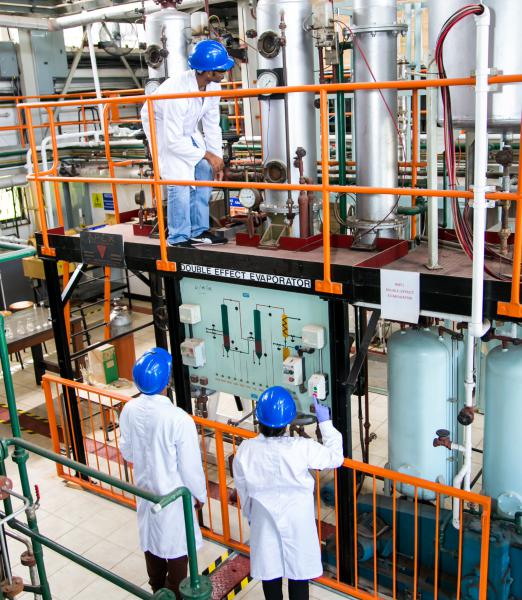
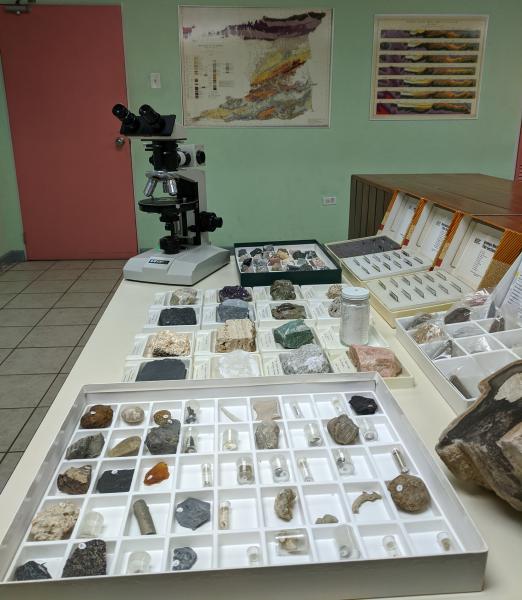
— BSc (Hons) Petroleum Geoscience
Petroleum Geoscience is concerned with understanding the structure of the earth for identification of potential areas of hydrocarbon deposits and to identify the hydrocarbon bearing zones, fault patterns and water ingress, in order to model them in sufficient detail so as to be able to design development programmes for economic exploitation. The programme majors in quantitative petroleum geology and geophysics courses, but also includes significant basic training in petrophysics and reservoir engineering.
Students who pass all mandatory 100 credits of courses as prescribed in the programme syllabus, subject to applicable regulations, will be recognized as having completed their degree and will automatically be placed on the Faculty of Engineering’s list of students recommended for the award of BSc (Hons) in Petroleum Geoscience. Students need not pass the Petroleum Geoscience Project at the first attempt to qualify for honours.

Postgraduate Degrees
The minimum requirement for admission to the taught Master's programme is stated below for the respective programme offerings:
-
MSc Chemical & Process Engineering / MSc Chemical & Process Engineering with Management is normally a Lower Second Class Honours BSc Degree in Chemical and Process Engineering
-
MSc Food Science & Technology is normally a Second Class Honours BSc Degree in Food Science & Technology, Natural Science or Nutrition (with Mathematics and/or Statistics and Chemistry at the Preliminary and Introductory Level) or Agriculture, or Chemical Engineering or Agricultural Engineering
-
MSc Petroleum Engineering / Postgraduate Diploma and MSc Petroleum Engineering & Management / MSc Reservoir Engineering is normally a Second Class Honours BSc Degree in Engineering/Natural Sciences (Physics & Chemistry majors)/Earth Sciences or an equivalent qualification, in respect of either Engineering and/or Engineering Management
Final approval of applications is subject to the Department's approval. A candidate applying for registration with a Pass degree may be considered for entry provided the candidate has acceptable industrial experience.
The minimum admission requirement for postgraduate degrees by research i.e. MPhil and PhD programmes, is normally an Upper Second Class Honours degree or its equivalent. The number and nature of courses taken will be determined by the background of the candidate and the degree of interest.
All students of the University are subject to the General Regulations for Students approved by the Senate of The UWI. Where there is conflict between the regulations of the Faculty and the University Regulations, the University Regulations shall apply.
For more information:
MSc Chemical & Process Engineering and MSc Chemical & Process Engineering with Management are accredited by the Institution of Chemical Engineers (IChemE, UK) to the BEng Level, en route to CEng. Currently effective from September 2022 to August 2027 (5 years).
MSc Food Science & Technology is accredited by the Institute of Food Science and Technology (IFST) of the UK. Currently effective from February 2022 to February 2027 (5 years).
MSc Petroleum Engineering and MSc Reservoir Engineering are accredited by the Energy Institute (UK) en route to CEng. Currently effective from September 2022 to August 2025 (3 years). MSc Petroleum Engineering and Management is accredited by the Energy Institute (UK) en route to CEng. Currently effective from September 2017 to August 2025 (8 years).
— MSc Chemical & Process Engineering
— MSc Chemical & Process Engineering with Management
— MPhil and PhD in Chemical Engineering
Postgraduate programmes in Chemical & Process Engineering and Chemical Engineering are geared towards the generation of new knowledge while developing and transferring methods, techniques, methodologies and tools that lead to improved processes in industry.
These programmes provide an avenue for those who possess a background in chemical engineering at the bachelor degree level to enrich their knowledge base and to develop and transfer methods, techniques and methodologies and tools aimed at strengthening engineering processes in the industry.

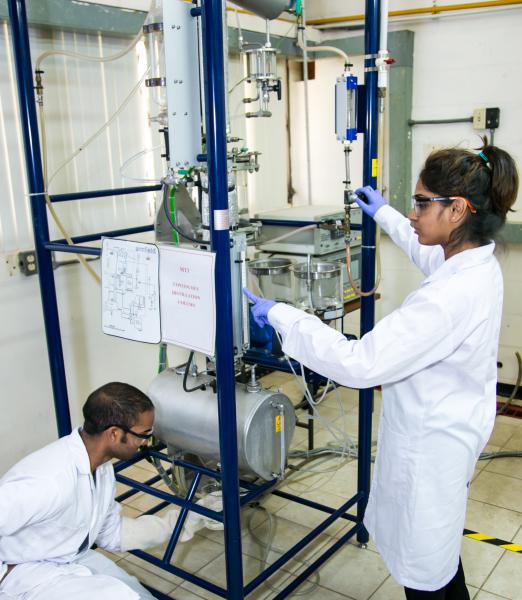
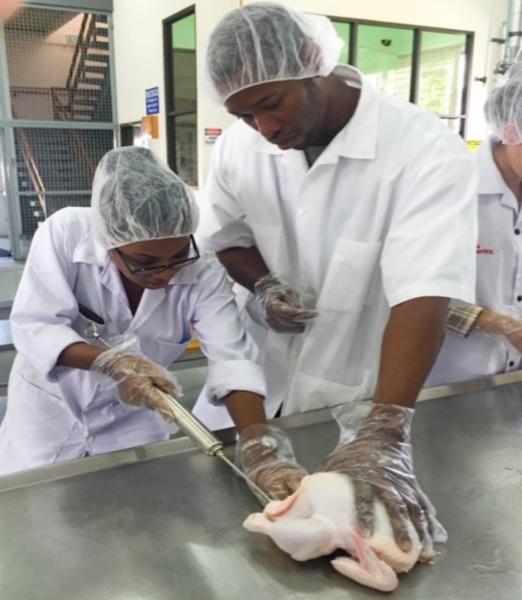
— MSc Food Science and Technology
— MPhil and PhD in Food Science & Technology
Food Science and Technology is multidisciplinary field that prepares students with a comprehensive knowledge of the biological, physical and engineering sciences to apply scientific principles toward the development of new food products, design of innovative processing/packaging/distribution technologies, improvement of food quality and nutritional value, enhancement of the safety of foods and in ensuring the wholesomeness and availability of our food supply.
Food Quality Assurance and industry best practices in regulations and manufacturing are fundamental aspects of the curriculum.

— MSc Petroleum Engineering
— Postgraduate Diploma and MSc Petroleum Engineering & Management
— MSc Reservoir Engineering
These degree programmes couple the application of earth and physical sciences to the evaluation and exploitation of natural hydrocarbon resources. Graduates will be equipped to tackle dominant problems often faced by the petroleum engineer related to fluid flow in porous media, which require sophisticated numerical techniques for their solution.
The petroleum management option provides specialized knowledge in decision-making, contractual negotiations and arrangements, financial implications and manpower management which is to be understood and executed at various stages of the petroleum sector.

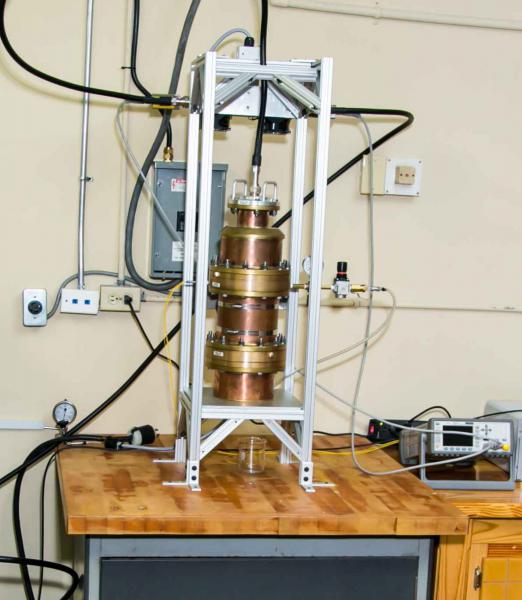
PE Limited (Petex) donates Educational License for Integrated Production Modelling (IPM) software to The UWI Petroleum Studies Engineering
The software is valued at GBP 4,961,606.13. Students of the Department of Chemical Engineering at The University of the West Indies, Trinidad and Tobago will benefit from the donation.
|
— MPhil and PhD in Petroleum Engineering or Petroleum Geoscience or Geoscience
These research degrees are aimed at training students to carry out research and development in relevant areas in order to bring about solutions to problems faced by or gaps in knowledge within the petroleum sector. The task involves furthering the frontiers of knowledge regarding Petroleum Engineering and Geoscience disciplines.
The major areas of research are on PVT, phase behavior, reservoir characterization, heavy oil recovery and oil recovery from Trinidad tar sands, reservoir characterization with nano-particle technology application, natural gas hydrates, enhanced oil recovery, wellbore stability during drilling operations, carbon dioxide capture and transmission for EOR and sequestration, artificial lift methods, waterflood-MEOR combo, rock mechanical properties, sedimentology, seismic and subsurface risk analysis, paleontology, micropaleontology, foraminifera, miocene clays, rock fractures and deformation.










